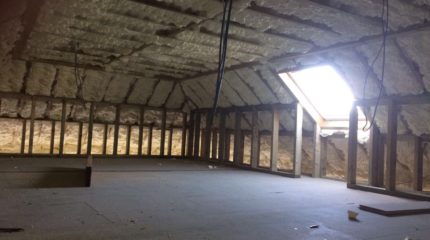What Type of Insulation Do You Need?
About IcyneneWhen it comes to spray foam insulation, there isn’t a one-size-fits-all insulation solution. This is one of the great things about Icynene® spray foam; there’s specialist products depending on the application, so the best results are achieved.
The good news is that when contacting an experienced Icynene® contractor they will advise on the best foam insulation option, so it’s not something to worry about getting right yourself.
There are two different types of Icynene® foam insulation; closed cell spray foam and open cell spray foam. The right spray foam type for you is determined on the type of application, from internal to external, building to boat.
Are internal walls being insulated?
For insulating internal walls, we recommend using open cell spray foam. This type of spray foam is used for internal and residential applications as open cell spray foam is softer and has an open cell structure. This means that buildings can still breathe. If a building can’t breathe, this means all air is trapped and mould could form. Icynene® eliminates this chance.

What type of Icynene® is required for roof insulation?
A significant amount of heat is lost through the roof of a house if it isn’t significantly insulated, and homeowners also have to bear in mind that thickness regulations must be met. Closed cell spray foam is completely air-tight, preventing heat from escaping, so this is the suitable foam insulation to request. The added benefit of choosing Icynene® is that it improves the structural integrity of the roof, future-proofing the property.
Is it the external walls that need to be insulated?
Some people think that if homeowners have cavity walls they shouldn’t insulate them. This is because there have been quite a few reported incidents where, for homes in locations that have frequent down-pours of rain and their home faces into the wind, water has entered the walls and caused serious mould. If Icynene® closed cell spray foam is used, homes will be insulated and protected without the risks mentioned above.
Icynene® doesn’t store water and is the least water absorbent of all spray foam insulation. This, and it fills to 100x its size, filling every nook and cranny in the void between the two walls, prevents cases of any mould or damp.
Which spray foam is best for underfloor insulation?
For older houses that have suspended flooring, closed-cell spray foam is recommended for underfloor insulation due to its rigid form. It will prevent air draughts between floorboards. If it’s a home with concrete flooring that requires insulation with foam insulation, the closed cell structure is particularly effective at stopping heat escaping.
To discuss any spray foam insulation requirements or to find out more about closed cell and open cell spray foam, get in touch with the friendly team at Mass Foam Systems for on 0800 246 5051 or get an instant quote.
Back to blogs



